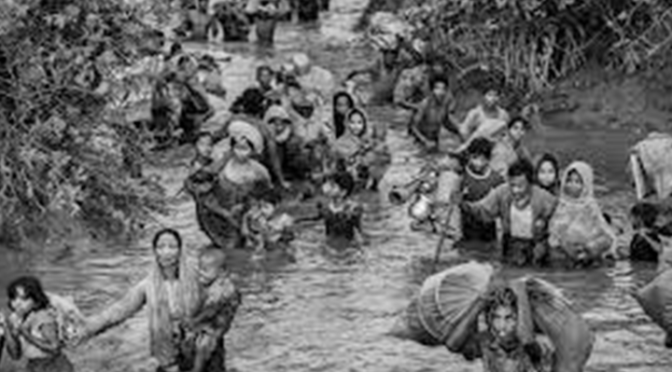Where would the Rohingyas go?
Posted on : January 1, 2018Author : AGA Admin

The Myanmar military has, once again, gone on a rampage in Rakhine, burning homes and villages, threatening and expelling the stateless Rohingya Muslims. Many have been killed and women have alleged rape. Some reports suggest some bodies have been burnt to destroy evidence. Many are desperately trying to escape to Bangladesh, which appears to have, at least for now, shed its hostility towards the influx and is letting them in. Rohingya Muslims’ rights are severely curtailed in Myanmar—they can’t practice their religion (Islam) freely, cannot meet in large gatherings and face discrimination when they look for work, and there are restrictions on the number of children they can have. They are not included in the census, and they do not have voting rights. In June, Myanmar didn’t let UN investigators visit Rakhine.
The world’s youngest Nobel laureate, Malala Yousafzai, appealed to Aung San Suu Kyi, Myanmar’s state counsellor (and de facto president) and a fellow laureate, to save Rohingyas but Aung San Suu Kyi has been silent. Aung San Suu Kyi was once, among the world’s most well-known prisoners of conscience. She led a non-violent struggle for democracy against the military, earning global respect including the Jawaharlal Nehru Award for International Understanding in 1993 when she was under house arrest. But since her release in late 2010, the world has discovered a different Suu Kyi. Her reluctance to criticize the military was earlier seen as strategic, until she had won elections. Now, she appears to hold the majoritarian view that Rohingya Muslims are not citizens of Myanmar. She has blamed Myanmar’s poor immigration controls for the crisis, reinforcing the idea that Rohingyas are illegal immigrants, even though they have lived in western Myanmar for nearly centuries. Even in her acclaimed collection of essays, Letters From Burma (1997), the word “Rohingya” does not appear. Myanmar’s numerous ethnic groups does not include Rohingyas. Rakhine forms the frontier between Muslim and Buddhist Asia, so violence there has wider implications. It is in this context that the Indian home ministry’s advisory to states to detect and deport Rohingya Muslims is astonishing and inhumane. The National Human Rights Commission has cautioned the government, saying that even if the refugees are not citizens, the government should consider that they might face persecution if they are pushed back. India has not signed the 1951 Refugee Convention, but it has abided by its spirit, and generously hosted refugees from Tibet, Bangladesh, Sri Lanka and Afghanistan over the years. In 1996, the Supreme Court ruled that refugees have certain rights, including the right to life and liberty, and in 2015, asked the Centre to extend citizenship to Chakma and Hajong refugees from Bangladesh.
Indian law, India’s practice of abiding by international expectations, long tradition of compassion, and humanitarian impulse, all suggest that India should let the Rohingyas remain, and join the collective global outrage which seeks to remind Aung San Suu Kyi of who she used to be, or was believed to be, so that she lives up to the image she once had. This can be one of the most beneficial ways through which Rohingya refugees can find shelter and more importantly, a feeling of home amidst the crisis overtaking their homeland.
Dhruvi Shah
Intern
AGA
1.1.2018





Leave a Reply